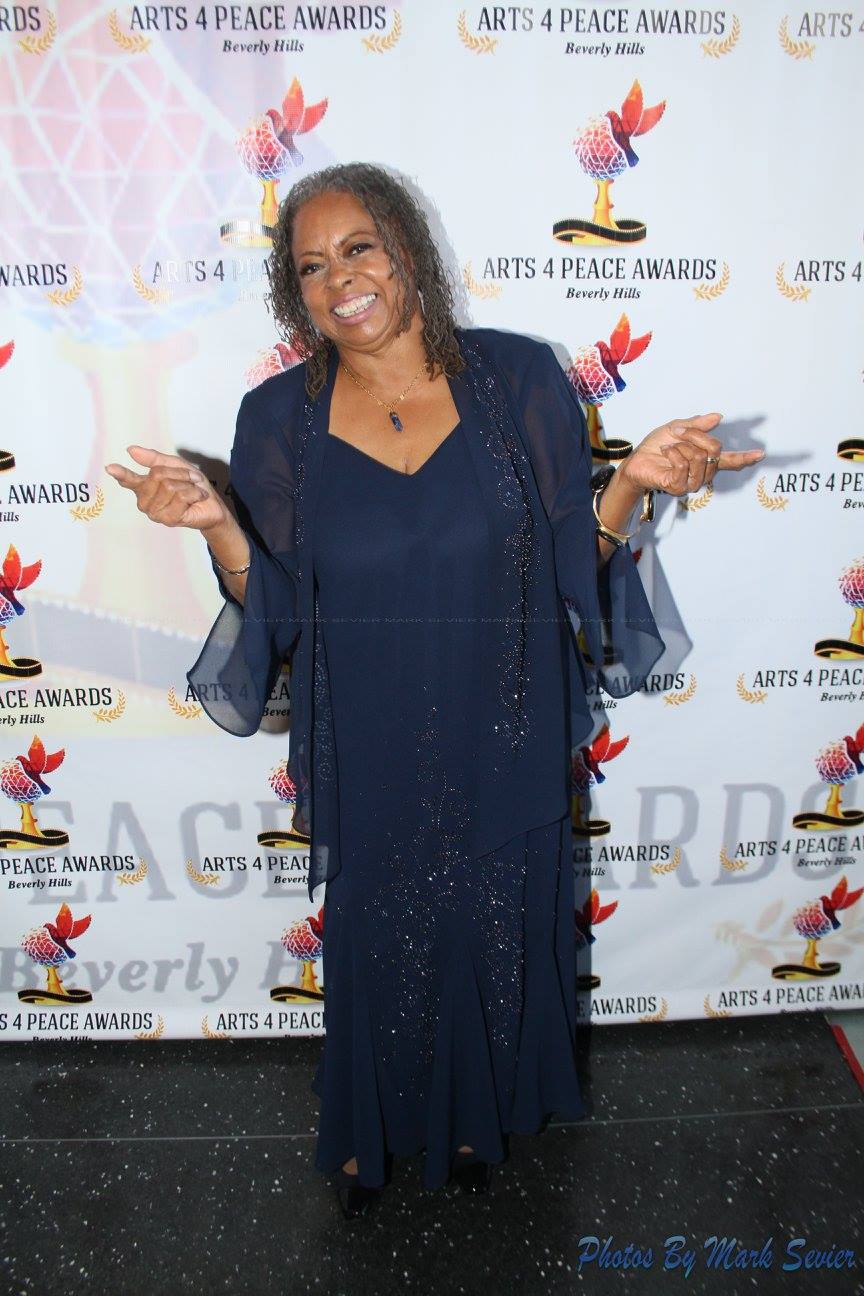Reatha Grey-The Actress’s Success and Comedy shows she is “Off the Rocker”
Commentary, Entertainment, Theater — By Buddy Sampson on June 18, 2018 at 11:19 pm
Cover and Inside Photo- Reatha Grey has revitalized her career and is doing great things. Photo by Mark Sevier.
By Buddy Sampson
Reatha Grey’s career as an actress is a story of Black achievement and success. Recently known for the television show “Off Their Rockers,” an award-winning show that aired on NBC and the Lifetime Channel, in which she and legendary actress Betty White play recorded pranks on unsuspecting people, Grey has achieved a lot in her storied career. She has appeared in television shows including “Grace and Frankie,” “Teachers,” “Legion,” “Ray Donovan,” “The Newsroom,” “Key and Peele,” “How I Met Your Mother,” and “Castle.” In 2016 Reatha received the NAFCA (African Oscar) Best Actress Award for an Independent Film for her role in “Betrothed.”
She also worked on a play called “Angry, Insecure, Men,” directed by Angel Terron. “It was somewhat autobiographical,” she laughed. “It was a domestic violence awareness play and it recounts three incidents in her life of domestic violence, and it’s a cautionary tale for women,” said Reatha Grey. “I played the part of Liz, the nosy neighbor and she’s not really nosy. That’s one of the parts of the play. The point of the play was that if you see something, say something, because it could save someone’s life.” Currently, she’s shooting a pilot with a rapper named Lil’ Dicky.
The daughter of a father, who was a dentist, and a mother that was a social worker, Reatha Grey grew up in Los Angeles. “My grandparents moved to Los Angeles in the late 40s, and there were still property sanctions in Los Angeles in the late 40s, which meant that Blacks could not move west of Western Avenue,” said Reatha Grey. “That is why Central Avenue was such a big deal. It was the hub of the Black community.” Indeed, according to Mary Ann Irwin of Irwinator.com, The African American community grew from just 75,000 in 1940 to almost 250,000 in 1950, and nearly 500,000 by 1960. (Irwin.) During this period black people were not permitted to live in more than a handful of neighborhoods, notably South-Central Los Angeles and Watts. Her grandfather, who lived in Nashville, Tennessee, decided to purchase a house near Pico and St. Andrews and initially was able to purchase a house west of Western Avenue. But he discovered, when he arrived in Los Angeles that the segregation of the era reared its head. “They wouldn’t allow him to take possession of the house and he had to go to court,” she said, “and was successful in breaking the sanctions and was able to move in.”
Her mother, after moving to Los Angeles, married, and divorced when she was young. And young Reatha’s first recollection was her grandfather’s house at Pico and St. Andrews. Later, when her mother remarried, they moved further west, and, as in many Black families in more affluent areas found, they were among the first Black families to populate the area. “We integrated the block, I was six years old at the time and didn’t know any better,” she reflected. Her stepfather, a lawyer, purchased a home in the affluent area of Windsor Hills, through foreclosure in the courts and discovered that racial tensions were higher than ever. “When we moved in, they actually burned a cross on our lawn,” said Reatha of the experience, which occurred in 1964. When her family realized that they were not wanted in the neighborhood, Reatha had a candid response. “Then we need to move,” she laughed. “I see no purpose in living here if they don’t want us here.”
Previously, Reatha’s grandfather had been beaten, assaulted in the South because he owned a Cadillac in the 1940s, and it was heresy in that region for a Black man, then called Negro, to have the appearance of success. He became a doctor when his father died because, in those times, there were no Black doctors, and White doctors would not treat him. Reatha’s grandfather worked his way through school, through medical school and distinguished himself, becoming a physician. Additionally, her grandfather started one of the first full service medical clinics in the 1950s, establishing his business at 42nd and Figueroa in Los Angeles. Reatha’s father, a prominent dentist in Los Angeles was friends with several of the Black stars in Los Angeles, including one huge superstar. “I remember going to visit my father and he was friends with Nat King Cole,” she remembered. “I remember being at Nat King Cole’s house and my father playing the piano and Nat King Cole singing,” she said. Her mother, who went to UCLA in her senior year, after attending Fisk University, was reticent in engaging with her classmates, who were White. “She was afraid to talk to White people because there were no Blacks there,” said Reatha. A socialite, her mother was a prominent member of many of the Black social clubs of the era.
The 1960s was a politically charged time, with civil rights laws being enacted, and the assassinations of President John Kennedy, Robert Kennedy and civil rights leaders, such as Malcolm X and Martin Luther King Jr. “When I was a child, I remember Martin Luther King Jr. coming to my grandfather’s house,” she reflected. “He and my uncle went to Morehouse together.”
Reatha Grey vividly remembers the Watts Riots. During that time, although the riots were primarily relegated to the South-Central area, she recalls a threat to one of her favorite malls, The Baldwin Hills Crenshaw Mall. During that time, many of the women were Diana Ross fans and wore wigs, imitating the iconic singer, including Reatha. “My main concern was that they were going to burn up my Diana Ross wig store,” she laughed. But she was stunned when she realized that the Watts Riots was a serious reality. After a curfew was lifted, she went with her friends to the mall, only to discover that the National Guard was encamped at the shopping center. It was then reality sunk in. “This is serious,” she said. Reatha, at the time lived a very sheltered life, so when her mother took her on a tour of Watts, she was stunned at what she saw. “I didn’t believe that there were any poor people in L.A. I had no idea. Everybody Black in Los Angeles was not in poverty in the 50s and the 60s.”
Fortunately for Reatha, she was shielded from a lot of the horrors of many of the incidents in Los Angeles, because of her affluent upbringing. However, when the Los Angeles Riots took place in 1992, it was close to home, and she witnessed several buildings on fire, a reminder of the racial turmoil that boiled over in the community. “They burned down three of the corners on the end of my street,” she said. “It was frightening.”
Reatha attended Los Angeles High School and had her first acting experience at the tender age of 6, playing the part of the wicked stepmother in Sleeping Beauty. “I just cackled, and the audience broke out into applause,” she said. From that point she fell hook, line and sinker into the acting profession. “Oh, I want to do this,” she explained. She attended Audubon Junior High, where she began to develop her acting chops. She also played violin and it cemented her desire to work in the entertainment business. Later, she attended Los Angeles City College, where she was able to land a USO tour which led her to travel to Asia. She discovered, during that time that the army bases were segregated, a reminder of racism, still prominent, even in the 1970s. When she returned, she landed small parts in television shows, such as “General Hospital,” “Three’s Company,” and several television movies, including one titled, “Angel Dusting.” Unfortunately, she was unable to garner the support of her family for her chosen profession, who wanted her to study to be a doctor or a lawyer.
Undaunted, her career began to flourish. She was featured in filmmaker Jamaa Fanaka’s first movie production, “Welcome Home Brother Charles,” playing the part of Carmen. It was her first foray in the Blaxploitation movies at the time, which were quite a phenomenon for Hollywood. “They saved Hollywood,” she said. “Everybody went to see Blaxploitation movies. It bought people back to movies.” Later, she owned a successful casting company, casting movies such as “I’m Gonna Git You Sucka,” and “Frank’s Place,” “The Fabulous Baker Boys,” among others. But the casting business became too stressful. “Hollywood chews people up and spits them out,” she explained. “I realized I couldn’t do it much longer.” She closed her casting company and went into ministry, spending eight years as a chaplain for the L.A. Mission and a year as program director at the Union Rescue Mission. “It was a rewarding job because you can see the significant change you’ve made in someone’s life,” she said, “and you feel great because you were able to participate in that process.”
The environment around Skid Row, with drugs, poverty and strife became too much for Reatha to handle and she took a break from it. She decided that she needed to go back to work. Acting was all she knew. She got an agent and began to receive small parts. She auditioned for Betty White’s “Off Their Rockers,” on NBC and was chosen as a series regular. “Betty White is a wonderful, wonderful person,” said Reatha. “She’s always in a good mood. She has a lot of energy and just is excited about life. We would go around and prank young people. It was funny to watch people’s reactions. It was a privilege and an honor to work with her.” After a three-year run, she did bit parts in “Castle,” “How I Met Your Mother,” and a movie called “Chocolate City.” “It’s a movie about male strippers and it amazes me how many of my friends have saw that movie,” she laughed. “I saw you in this movie on BET. I said, ‘what are you doing watching male strippers?’ As a matter of fact, my cousin’s pastor’s wife said she saw me in Chocolate City. I said um hmmm…does your husband know you’re watching this?”
The life of Reatha Grey has been rich with life experience, but she’s not done yet. Look for amazing projects in the future from this dynamic and funny actress. But know that this talented actress is nowhere near off her rocker. “It’s never too late, and you’re never too old,” said the actress, who is forever young. Visit her website at www.reathagrey.com. And be sure to catch her at “Public Comment,” at Hollywood Fringe. June 18-24th.




 Tweet This
Tweet This Digg This
Digg This Save to delicious
Save to delicious Stumble it
Stumble it




